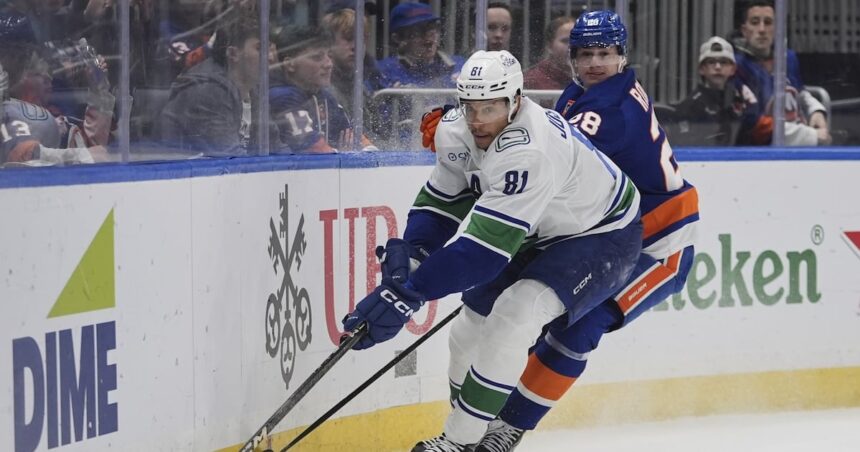In a move that signals the Maple Leafs’ commitment to adding grit and versatility to their forward lines, Toronto has acquired Dakota Joshua from the Vancouver Canucks in exchange for a 2028 fourth-round draft pick. The trade, announced Thursday morning, brings a physical presence to a Leafs roster that has often been criticized for lacking toughness in crucial playoff moments.
Joshua, 28, is coming off his most productive NHL season, posting career highs with 18 goals and 14 assists over 63 games with Vancouver. His emergence as a reliable bottom-six forward with scoring touch makes this acquisition particularly intriguing for Leafs fans who have long demanded more physicality without sacrificing skill.
What makes this trade fascinating isn’t just the player Toronto is getting, but what his addition represents. The Maple Leafs have struggled to advance beyond the first round of the playoffs for years despite boasting elite talent in Auston Matthews, Mitch Marner, and William Nylander. The persistent criticism has been that the team lacks the necessary sandpaper to withstand the increased physicality of postseason hockey.
At 6-foot-3 and 206 pounds, Joshua brings exactly that element to Toronto’s lineup. His willingness to engage physically along the boards and in front of the net should complement the Leafs’ skill players by creating space and retrieving pucks. Perhaps most importantly, he’s shown he can contribute offensively while playing this role – something Toronto has desperately needed from their bottom-six forwards.
For Vancouver, the return might seem modest, but the salary cap considerations likely factored into the decision. The Canucks continue their retooling process under GM Patrik Allvin, and collecting future assets aligns with their longer-term strategy.
What’s particularly noteworthy about this deal is Toronto’s willingness to part with a future asset rather than a current roster player. New GM Brad Treliving has demonstrated a different approach than his predecessor Kyle Dubas, showing less attachment to draft picks when the opportunity to immediately improve the NHL roster presents itself.
“Joshua represents exactly what we’ve been looking to add,” Treliving stated in the team’s press release. “He brings size, skill, and a competitive edge that will make us harder to play against.”
The Mississauga, Ontario native returns to his home province after developing his game in Vancouver, where he evolved from a fringe NHL player into a reliable contributor. That development curve suggests Joshua might have even more to offer as he enters his prime playing years.
For Leafs fans who follow our CO24 Trends coverage, this acquisition continues the NHL-wide pattern of prioritizing players who blend physical presence with skill, rather than one-dimensional enforcers or purely skilled players who struggle in heavier games.
The question now becomes where Joshua fits in Toronto’s lineup. He could slot into a third-line role with players like David Kämpf and Max Domi, or potentially move up to the second line in certain matchups. His versatility to play center or wing gives head coach Sheldon Keefe valuable options for in-game adjustments.
What remains to be seen is whether this move is just the beginning of Toronto’s offseason reshaping. The pressure to advance deeper in the playoffs has never been higher, and simply tinkering around the edges may not be enough to satisfy a fanbase growing increasingly impatient with playoff disappointments.
As we’ve discussed in our CO24 Opinions section, the Maple Leafs’ championship window with their current core isn’t infinite. Adding a player like Joshua represents a recognition that complementary pieces matter significantly in building a complete roster.
For a team that has long emphasized skill and speed, this trade shows an evolution in Toronto’s team-building philosophy. The modern NHL requires balance – the kind of balance that players like Dakota Joshua represent. He’s not a superstar, but he might just be the type of player who makes a crucial difference when the games matter most.
Only time will tell if this acquisition helps push the Maple Leafs beyond their playoff struggles, but for now, it represents a thoughtful addition that addresses a clear organizational need without mortgaging significant future assets.























